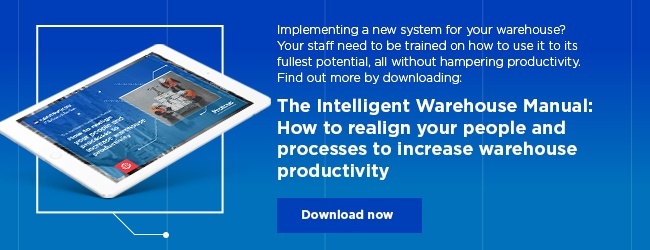5 ways a WMS makes life easier for warehouse staff.

A warehouse management system (WMS) implementation requires change, and this can prove very unsettling for staff. Any new system will take them out of their comfort zone, forcing them to break established habits and adopt different ways of working.
The training provided by WMS vendors can address some of these fears – as an experienced third party removed from day-to-day life in the warehouse, they can act as a reassuring and knowledgeable voice of reason for employees who are concerned by the prospect of change.
However, training alone isn’t enough. How staff perceive the change is critical. They need to buy into the new system for it to truly work, not just to prevent warehouse operations from breaking down, but to realise all the benefits that a WMS can offer.
The good news is that a WMS will actually make their jobs easier and more rewarding. Making sure they understand why this is the case will go a long way to overcoming any doubts or apprehensions. Here are some of the most compelling reasons why a WMS will make life on the shop floor easier:

Two of the biggest frustrations in the warehouse are data entry and paperwork. A WMS will significantly reduce both by automating and optimising key functions such as inventory movements, picking, packing, shipments and receipts, organising tasks in the most logical and efficient way.
Instead of using manual pick lists that have to be printed out, double-checked and sorted, staff will get automated pick lists with clear instructions on where stock keeping units (SKUs) are located. A WMS also streamlines inventory management processes, reducing the amount of administration required for stock counts and replenishment. Overall, staff will have fewer manual tasks to worry about and less paperwork to check.

When the team’s workload is unbalanced, frustration and resentment can lead to problems with morale. Low productivity needs to be avoided, particularly if it results in overstretched staff missing deadlines or creating bottlenecks.
A WMS can dynamically assign tasks to team members, ensuring they are clear on their responsibilities. It also matches tasks to staff with the right skills, only assigning forklift duties to qualified operators, for example. Managers have full visibility of work allocation across the team and can easily spot any issues.

With automatic task allocations and clear instructions, operatives will be able to get on with their work knowing exactly what they should be doing and where they should be doing it. A WMS also gives managers much greater visibility of how employees are getting on without constantly having to ask them what they are doing or micromanaging them.
Workers can feel reassured that managers have access to real-time data that reflects their true performance and output over an extended period of time, rather than just a snapshot at a particular moment. This can lead to more constructive conversations about training, development opportunities and realistic goals.

As well as reducing paperwork and admin, the insights delivered by WMS can help you to optimise your warehouse layout, mapping the most efficient routes and reducing the number of steps involved in fulfilling orders.

No one wants to feel responsible for mistakes, particularly as some warehouses choose to publish individual or group error rates internally to stimulate competition. A WMS helps your teams to be more accurate as they complete their tasks, meaning staff can avoid errors and do their jobs better, ultimately giving them better job satisfaction.
Nearly a quarter of all distribution centres expect that the volume of items they ship will increase dramatically by 2020 and that they will need to respond to increasing demands from consumers and higher expectations of retailers. An effective warehouse management system implementation is essential to meet these challenges but so is a motivated, trained and effective warehouse team. By explaining to warehouse staff how a WMS will make their lives easier, you will get their buy-in to work together to meet the challenges of the future.
.png?width=219&name=logo%20(1).png)










